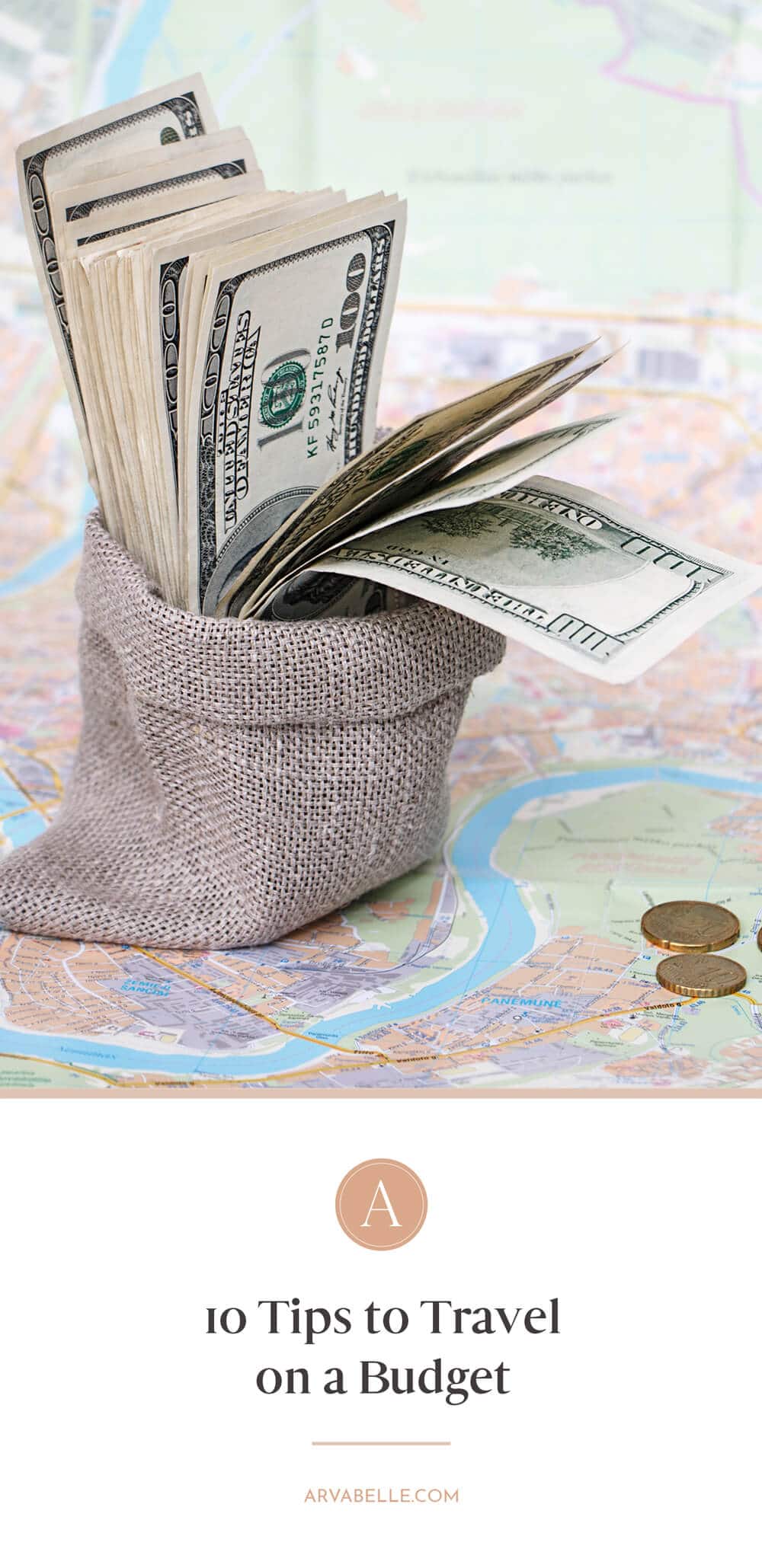
Over the last few years I’ve had the opportunity to travel to quite a few places. All without using credit card rewards, and without breaking the bank. These are my top 10 tips for traveling on a budget.
10. Travel in Off-Seasons
Everything is going to be the most expensive and the most booked up during peak seasons (the week of spring break, the middle of summer, and around holidays).
Flights and hotels are going to be much cheaper when you’re not traveling in peak season.
Traveling in off seasons may not always be possible, but you can use the same idea even with activities during the day. Things are cheaper and generally less crowded if you go at odd hours (like super early in the morning or during lunch time).
9. Book Flights & Accommodations In Advance
If you can, buy your flights and book your accommodations with plenty of time until your trip.
The closer it gets to the date that you leave, the more expensive it’s going to be. Between countries in Europe, if you book flights a month or two in advance, you can get roundtrip plane and train tickets for between $40 and $100. Only traveling one way? Your tickets will be even cheaper!
Even though you do want to book your travel in advance, you don’t necessarily want to book excursions and attractions until you get there. (See Tip #4)
For Flights
For flights, I always book using Google Flights. You can use flexible dates and see how the prices vary based on when you choose to travel.
Tip: When you’re booking anything, use a private browser window!Your browsing history can and will affect the price that’s shown
For Trains
For European travel, Omio is a great site to book train tickets on.
You can get tickets to pretty much anywhere, and they are usually reasonably priced. You can sort tickets by departure and arrival times, duration, etc.
Overnight trains can be extremely cheap, but you get what you pay for. You either need to be a really heavy sleeper, or anticipate not getting much sleeping.
Hidden-City Ticketing
Hidden-city ticketing is when you book a cheaper flight that has a layover in the city you actually intend on going to. You get off at the layover, and you ditch the last leg of your flight.
I think there are ways you can technically get in trouble with the airlines for doing this, so it’s up to you if you’re willing to risk that.
8. Skip The Hotel
A key trick to traveling on a budget is to skip the hotel. Opting to do this really just depends on your personal preference. If you’re young, traveling alone, or traveling with a few friends, hostels are great. But again, you get what you pay for.
Hostels
HostelWorld and TripAdvisor are great for finding hostels and reading reviews.
But when you actually book a bed, book through the hostel’s individual website. (If they have one). Often times, hostels will give you discounts for booking directly through their websites instead of going through a third party, like HostelWorld.
If dorm rooms aren’t your thing, many hostels offer private rooms like hotels. Often times these rooms aren’t too much more than a bed in a dorm room. So, if the hostels you’re looking at have a private room option, it might be worth looking into.
Hostels have several perks. A lot of times hostels have free food, or at least a kitchen that’s available to use.
One of the biggest upsides with hostels, is that they usually have a free luggage storage room. If you arrive early, or if you’re staying later than your checkout time, you can leave your luggage in a locked room or a locker. (Usually for free!) It’s extremely nice to have the freedom to wander the city without dragging your luggage around.
AirBNB
Another option is AirBNB. If you haven’t heard of AirBNB, it’s basically where you can rent out a home, apartment, or a room for a short stay.
AirBNB has referral bonuses. So if you are traveling with friends, use those referral links!
I’ve done this with several groups of friends. We would all refer each other, and basically get a discount each time we booked an AirBNB.
7. Only Pack in a Backpack
I know, packing in just a backpack seems like it would be hard, but I promise it’s not that bad. Just get a good backpack – don’t use your canvas college backpack like I did. It gets wet, and it just does not work.
How does packing in a backpack save you money?
With budget airlines and a lot of European airlines, the flights themselves are cheap, but if you have more than just a personal item, they charge you $70+.
To me, it makes more sense to just pack lighter. If you’re paying that much to bring your luggage, you probably could have just bought a nicer flight where that was included in the price.
My biggest tip for packing light is to bring half the clothes you normally would.
Again, to me it makes more sense to pay $2 to do laundry at the hostel or hotel one night than to pay $70 to bring an extra bag.If you are planning on doing laundry, make sure you check ahead of time that there is actually a laundry facility available. You don’t want to be traveling in dirty clothes for weeks.
Don’t overspend on souvenirs. Unless it’s small or something functional that you actually need, souvenirs are usually pretty useless and they just end up taking up a lot of space in your luggage.
6. Eat Like a Local
Learning to eat like a local is key to learning how to travel on a budget.
The typical food-related travel tips are bringing a snack and refillable water bottle when you go to the airport, and when you’re walking around for a long day. While this is a good tip, the real money is spent on your meals.
When you’re looking for actual meals, anywhere near a tourist attraction is going to be a ripoff. The food is going to be bad, and it’s going to be expensive. You can usually walk just a couple of blocks away and there will be smaller, family owned, local businesses that are cheaper and much higher quality.
Don’t be afraid to ask locals walking around what they recommend or if you’re in an AirBNB, ask your airbnb host!
You can also save money on food by going to local markets, these can be a lot of fun, and you can make a picnic out of it!
Depending on what country you’re in, you may want to be cautious with some of the street food. You don’t want to get sick in a foreign country! Use common sense when buying street food, and research what other travelers recommend for region you’re in.
5. Walk or Take Public Transportation
Walking and taking public transportation is going to be your cheapest option while traveling.
Walking, if you can, is obviously going to be the cheapest option. It’s completely doable if you plan your route ahead of time!
Many cities will also have rental bikes that you can use. But a word of caution, be careful with motor bikes. If you’ve never driven a moped, a foreign country is not the place to try it.
Depending on where you travel to, walking or biking may not be the best option, or an option at all. In that case, you want to look into what public transportation is available to you.
More often than not, passes for trains, buses, ferries, and boats are going to be cheaper than using ride sharing apps. Look for deals on public transportation passes that would work work for the length of your stay and the modes of transportation you’re using.
A couple of examples: In London they have the Oyster card, which is a pre-loaded card that works on buses and the Underground. In Venice, they have waterbus passes available for different lengths of time. So just get whatever is appropriate for the amount of time you’re staying
4. Find Deals on Excursions & Attractions
You may want to wait on booking excursions and activities if possible. If there’s something that you really want to do or that might be sold out, go ahead and book it. But for other activities, you can get discounts or negotiate the price down if you wait.
If you are a student bring your student ID and visa to everything! You will get a lot of discounts you may not be expecting! You can usually get student discounts and museums and even on tours or at hostels.
Some galleries & museums will have one day a month, or one day a week with free admission. See when these days are and if they work with your schedule.
Learn how to haggle with people trying to sell you tours outside of major attractions! They will go down in price!
These tour groups usually have set times that groups leave. Those groups are almost never full, but they want to fill as many spots as possible.
Haggling pretty easy to do if you have another person traveling with you. Sometimes you can negotiate a 2-for-1 price, or at the very least get a steep discount.
3. Your Phone Plan
You don’t necessarily even need to have cell service when you travel…but it’s probably a good idea in case of an emergency.
Do not let your phone provider rip you off! If you don’t have any travel plan at all, they are going to charge you insane fees. Even if you do add on a travel plan, they’re probably going to charge you between $60-$120 dollars for a very small international data limit. If you go over that limit, they’ll charge you the full amount again!
When you’re not on wifi turn off your phone data. Or if you’re traveling for an longer period of time, get a new SIM card so that your phone works in that country. SIM cards are inexpensive, and are a great option for extended travel periods.
To navigate without phone data you can download offline maps with Google Maps. Google Maps will just save a city map to your phone, and you can access it at any time.
You won’t be able to get directions, but you can always see where you are, and the navigation dot has a directional field so that you always know which way you’re facing.
2. Understand Credit Card & Bank Fees
Before you travel, it’s incredibly important to understand the fees your different accounts may incur. Credit cards, debit cards, and banks will charge you foreign transaction fees just for using their services in other countries. This fee is usually around 3%. It doesn’t sound like much, but with each purchase you make it can start adding up really quickly.
Look up your cards, look up your banks, and make sure you know who charges what.
Credit Cards & Debit Cards
When looking for a good travel credit card or debit card, you want to get a card with no foreign transaction fees.
For a debit card, I would highly highly recommend a CapitalOne 360 card. This card has no foreign transaction fees, and no ATM fees at most banks. (Be sure to check the local ATM terms though. Some will still have their own fees.)
I’ve used this card in 11 countries so far, and I’ve had zero issues with it. Capital One has fantastic customer support, so if you run into any problems, that’s always a plus.
Merchant Fees
Something to take note of: when you’re making a purchase in a foreign country, sometimes the card readers are going to give you the option of choosing the foreign currency or USD.
If you have a card with no foreign transaction fees, always choose the foreign currency and not USD.
Regardless of the type of card you have, if you choose USD, you will be charged a merchant transaction fee. It’s not the bank or credit card company that’s doing it. It’s the independent vendor you’re purchasing from.
I learned this by accidentally choosing USD when I was buying a food at an airport. The vendor charged me a 12% transaction fee. So you want to avoid that.
1. Use Your Social Network
The number one tip for traveling on a budget is to use your social network, both online and in real life.
If you need people to travel with, make an Instagram story asking is anyone wants to come. Reach out to friends, family, friends of friends etc.
Ask people if they know anyone in the city you’re going to. You may find a free place to stay, or at the very least some local recommendations. They may even have some sort of resident pass they’ll let you use for extra discounts.
Also if you have a skill that is useful for advertising or an online following, you can definitely leverage that to get free food or accommodations.
If you have a large Instagram following, you could approach hotels or resorts maybe get discounts, or maybe get a free stay in exchange for advertising their hotel.
If you’re into food photography, or videography, you could approach restaurants and cafes, and potentially get free food in exchange for taking professional photos.
You don’t have to be weird or rude about reaching out to people. As long as you’re tactful, it never hurts to ask. You never know, you might end up saving some money!

